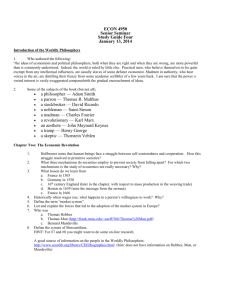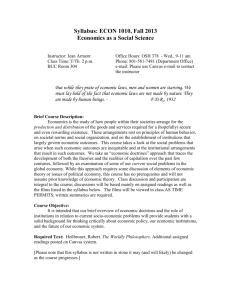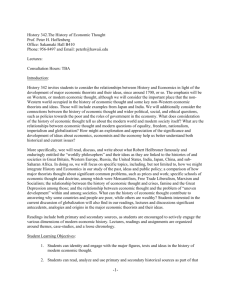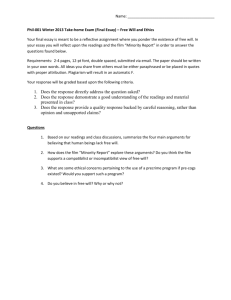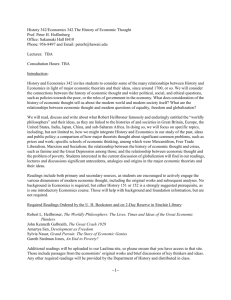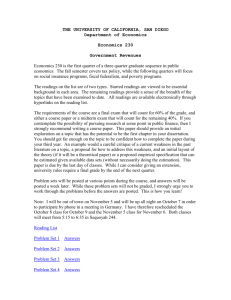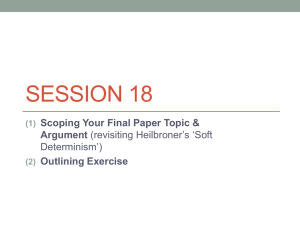ECON 1010-001, Jean Arment
advertisement
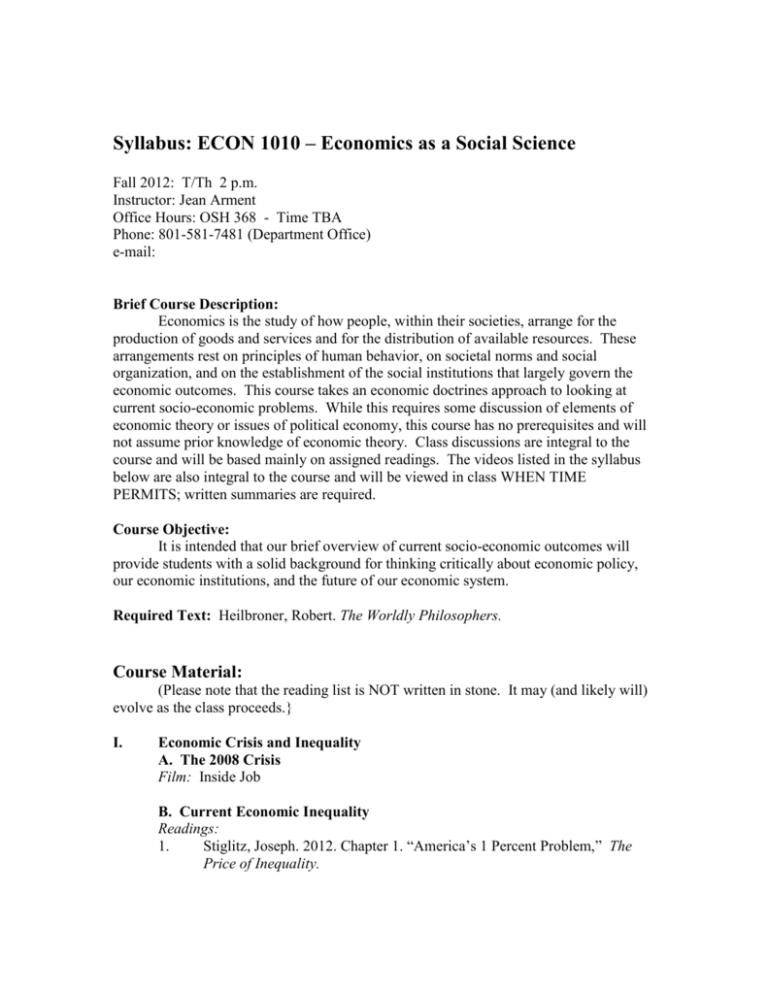
Syllabus: ECON 1010 – Economics as a Social Science Fall 2012: T/Th 2 p.m. Instructor: Jean Arment Office Hours: OSH 368 - Time TBA Phone: 801-581-7481 (Department Office) e-mail: Brief Course Description: Economics is the study of how people, within their societies, arrange for the production of goods and services and for the distribution of available resources. These arrangements rest on principles of human behavior, on societal norms and social organization, and on the establishment of the social institutions that largely govern the economic outcomes. This course takes an economic doctrines approach to looking at current socio-economic problems. While this requires some discussion of elements of economic theory or issues of political economy, this course has no prerequisites and will not assume prior knowledge of economic theory. Class discussions are integral to the course and will be based mainly on assigned readings. The videos listed in the syllabus below are also integral to the course and will be viewed in class WHEN TIME PERMITS; written summaries are required. Course Objective: It is intended that our brief overview of current socio-economic outcomes will provide students with a solid background for thinking critically about economic policy, our economic institutions, and the future of our economic system. Required Text: Heilbroner, Robert. The Worldly Philosophers. Course Material: (Please note that the reading list is NOT written in stone. It may (and likely will) evolve as the class proceeds.} I. Economic Crisis and Inequality A. The 2008 Crisis Film: Inside Job B. Current Economic Inequality Readings: 1. Stiglitz, Joseph. 2012. Chapter 1. “America’s 1 Percent Problem,” The Price of Inequality. 2 II. An Introduction to Capitalist History, Doctrines and Institutions A. On the “Great Transformation” – Feudalism to Emerging Capitalism Readings: 1. Heilbroner, Robert. 1972. Chapter 2. “The Economic Revolution,” The Worldly Philosophers. 2. Polanyi, Karl. 1944. Chapter 6. The Self-Regulating Market and the Fictitious Commodities, The Great Transformation. B. Capitalism Takes Hold Readings: 1. Heilbroner, Robert. 1972. Chapter 3. “The Wonderful World of Adam Smith,” The Worldly Philosophers. C. The British Corn Laws and the Free Trade/Globalization Debate Readings: 1. Heilbroner, Robert. 1972. Chapter 4. “The Gloomy Presentiments of Parson Malthus and David Ricardo,” The Worldly Philosophers. D. Social Distress in Britain and Marx’s Critique of Capitalism Readings: 1. Heilbroner, Robert. 1972. Chapter 5. “The Inexorable System of Karl Marx,” The Worldly Philosophers. E. The Age of Excess and the Elimination of “Distribution” from Economic Discourse Readings: 1. Heilbroner, Robert. 1972. Chapter 7. “The Victorian World and the Underworld of Economics.” The Worldly Philosophers 2. Heilbroner, Robert. 1972. Chapter 8. “The Savage Society of Thorstein Veblen,” The Worldly Philosophers. 3. Walby, Sylvia. 2009. Ch. 9. “Measuring Progress,” Globalization & Inequalities: Complexity and Contested Modernities. pp. 314 – 321. 4. Nussbaum, Martha. 2000. “II. The Capabilities Approach: An Overview” (pp 4-11) and “IV. Central Human Capabilities” (pp 70-82) in Women and Human Development. Film: Who’s Counting? F. Unemployment, Urbanization and the Informal Economy Readings: 1. Heilbroner, Robert. 1972. Chapter 9. “The Heresies of John Maynard Keynes,” The Worldly Philosophers. 2. Kunzig, Robert. 2011. “Population 7 Billion. National Geographic Magazine. December. 3. DeParle, Jason. 2007. “A Good Provider is One Who Leaves.” New York Times Magazine. Apr. 22. On WebCT. 4. “George, Rose. 2008. Chapter 5. “In the Cities,” in The Big Necessity. 3 Film: 1. The Other Side of Immigration 2. Maquiladoras III. Social Welfare in the Global Economy A. Winners and Losers Readings: 1. Finnegan, William. 2003. “The Economics of Empire.” Harper’s. May. 2. Reinert, Eric. 2010. Chapter 5. “Globalization and Primitivization: How the Poor Get Even Poorer.” How the Rich Countries Got Rich . . . and Why the Poor Countries Stay Poor.” Film: Life and Debt B. The NAFTA Experiment – Economic Outcomes in Mexico and the U.S. Readings: 1. Romero, Fernando. 2008. Hyper-Border: The Contemporary U.S.-Mexico Border and Its Future. pp. 42-49. 2. Wise, Timothy. 2010. “The impacts of U.S. agricultural policies on Mexican producers.” Global Development and Environmental Institute, Tufts University. C. Food and Water Policy Readings: 1. Gonzalez, Carmen G. 2011. “Climate Change, Food Security, and Agrobiodiversity: Toward a Just, Resilient, and Sustainable Food System.” Available at: http://works.bepress.com/carmen_gonzalez/1 . 2. Kaufman, Frederick. 2010. “The Food Bubble: How Wall Street Starved Millions and Got Away with It,” Harper’s Magazine. July. 3. MacFarquhar, Neil. 2010. “African Farmers Displaced as Investors Move In,” New York Times,” Dec. 22. 4. Estabrook, Barry. 2009. “Politics of the Plate: the Price of Tomatoes.” Gourmet Magazine. March. 5. Shiva, Vandana. 2002. Ch. 4. “The World Bank, WTO and Corporate Control Over Water.” Water Wars. Film: 1. Food, Inc. 2. Blue Gold IV. Toward a Sustainable Economy Readings: 1. Boulding, Kenneth. 1966. The Economics of the Coming Spaceship Earth. 2. The Millennium Development Project. For background on Goals 1 – 8, go to: http://www.unmillenniumproject.org/goals/index.htm V. Class (Group) Presentations 4 Course Evaluation: Midterm Exam: Final Exam: (Group) Paper/Presentation: Short Papers: Class Participation: 20% 20% 24% 20% 16% The “short papers” category consists of written film responses and (time permitting) one or two in-class assignments. Each paper or assignment will earn a maximum of 4 points toward your total grade, with 20 points being the most you can earn in this category. The “final paper/presentation” category consists of a 10-minute presentation and a 7-10 page book report/discussion. Books will be chosen from a list provided by the Instructor. Groups will be formed and a book selected by Oct. 1. If you need help writing clearly or correctly, there is a writing help center in Marriott Library. A maximum of 10 points of extra credit will be allowed and can be earned by submitting extra “short paper” video responses or by writing a short but thoughtful commentary on an current article concerning one of the socio-economic issues we will be discussing in class (2 points per commentary.) The course has been organized around material with immediacy to our current economic situation and is meant to facilitate class discussion of contemporary issues. Class participation is therefore of central importance to the learning experience. Participation will be judged on both attendance and contribution to class discussions. The midterm and final exams will consist of essay questions designed to test students’ understanding of the relationship between the social and economic components of the issues being discussed. Grading: Final grades will depend on performance, based on the weights provided above, where a grade of 90-100 is in the “A” range, 80-90 in the “B” range, etc. Earning an unblemished “A” will require consistently distinctive work. Minus and plus grades will be at the extremities of these ranges (eg., 92 and above, A, 89 – 91, A-, etc.) and will likely extend a bit beyond in the direction to provide students benefit of the doubt, particularly for those at the lower reaches of the distribution. Adjustment of exam, paper, and participation grades to reflect a curve will be at the discretion of the instructor. Students are expected to provide their own bluebooks for the exams. Makeup: Students must take exams on the scheduled dates. Should a serious conflict arise a student may make arrangements to take an exam through the Campus Testing Center (which I believe charges a $5 fee) before the remainder of the class takes the exam. In no case—with exceptions of severe medical emergency requiring broken bones 5 and a doctor’s certification—will a student be allowed to take the exam after the rest of the class. A missed exam may mean failure in the course. Disability Policy: The U of Utah seeks to provide equal access to its programs, services and activities for people with disabilities. If you will need accommodations in the class, reasonable prior notice needs to be given to the Center for Disability Services (CDS), 162 Olpin Union Building, 581-5020. CDS will work with you and the instructor to make arrangements for accommodations. All written information in this course can be made available in alternative format with prior notification to the Center for Disability Services.
